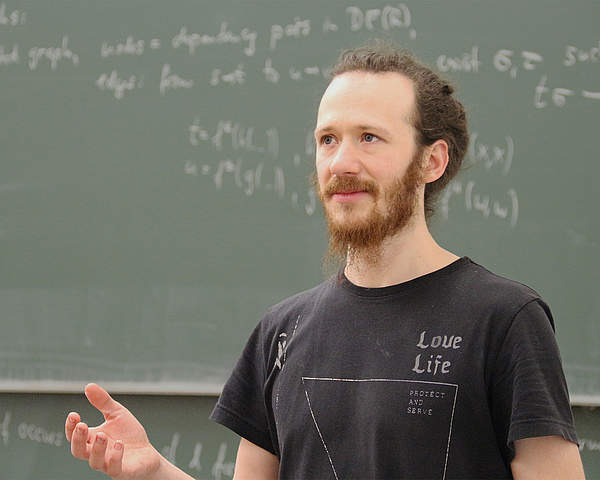 A walk in the woods: you can feel the soft moss under your feet, notice how rotten branches and twigs break when they appear, feel the gnarled bark of a tree. Impressions such as these are perceived through the sense of touch and have therefore been denied to digital worlds until now. Paul Strohmeier, a computer scientist at Saarland University, has now developed a new process that can artificially generate such haptic sensations. This makes virtual reality and "extended reality" comprehensible in the truest sense of the word. For his dissertation on this topic Strohmeier has now been awarded by the world's largest conference for human-computer interaction.
A walk in the woods: you can feel the soft moss under your feet, notice how rotten branches and twigs break when they appear, feel the gnarled bark of a tree. Impressions such as these are perceived through the sense of touch and have therefore been denied to digital worlds until now. Paul Strohmeier, a computer scientist at Saarland University, has now developed a new process that can artificially generate such haptic sensations. This makes virtual reality and "extended reality" comprehensible in the truest sense of the word. For his dissertation on this topic Strohmeier has now been awarded by the world's largest conference for human-computer interaction.
With his new method, Saarbrücken-based computer scientist Paul Strohmeier creates real-looking haptic sensory impressions. He achieves this by adjusting the frequency and intensity of vibration impulses in the millisecond range precisely to the movements of a person. The impulses are then no longer perceived as vibration, but rather as a property of the material you are touching. "In this way it is possible to evoke different impressions of the sense of touch, for example friction or the feeling for certain surface structures," says Strohmeier. Movement sensations such as weight or resistance are also perceived through the fingertips and can be artificially generated using the new process.
Strohmeier is currently working with students at Saarland University on shoes in which this technology is incorporated. Among other things, they could be used in virtual reality (VR). In virtual reality, people are primarily exposed to visual stimuli and auditory impressions. "With the shoes it will also be possible to address the sense of touch or the sensation of movement. If you walked along a gravel path, for example, you could feel the stony flooring under your feet. This makes it easier to immerse oneself in virtual worlds," says Strohmeier. The possible applications go even further, for example in augmented reality: things that were previously beyond the horizon of human perception could now be experienced as haptic sensations. If the technology were to be coupled to sensors, the user could, for example, feel resistance when approaching a toxic but odourless gas.
Strohmeier carried out the basic research for his new development with his doctoral thesis entitled "Shaping Material Experiences: Designing Vibrotactile Feedback for Active Perception". This was recently awarded the "Outstanding Dissertation Award" of the "Special Interest Group on Computer Human Interaction (SIGCHI)". The prize is considered one of the most prestigious awards for doctoral theses in this field of research and was to be presented at the world's largest HCI conference, the "ACM Conference on Human Factors in Computing Systems (CHI)", which had to be cancelled this year due to the corona crisis. According to the jury, the research work will improve the possibilities of how haptic stimuli will be used in the field of human-computer interaction in the future. Strohmeier wrote his dissertation at the University of Copenhagen in Denmark.
Since July 2019, Strohmeier has been a postdoctoral researcher in Professor Jürgen Steimle's research group on Human-Computer-Interaction at the Saarland Informatics Campus. The international reputation of the group and the research environment at Saarland University were the reasons for moving from Copenhagen to Saarbrücken. "I particularly like the fact that the cooperation of different disciplines and institutes is so easy here. Whether material sciences, psychology of perception or world-leading computer science institutes - everything is in close proximity to each other," says the computer scientist about his new research home.
www.uni-saarland.de
























































































